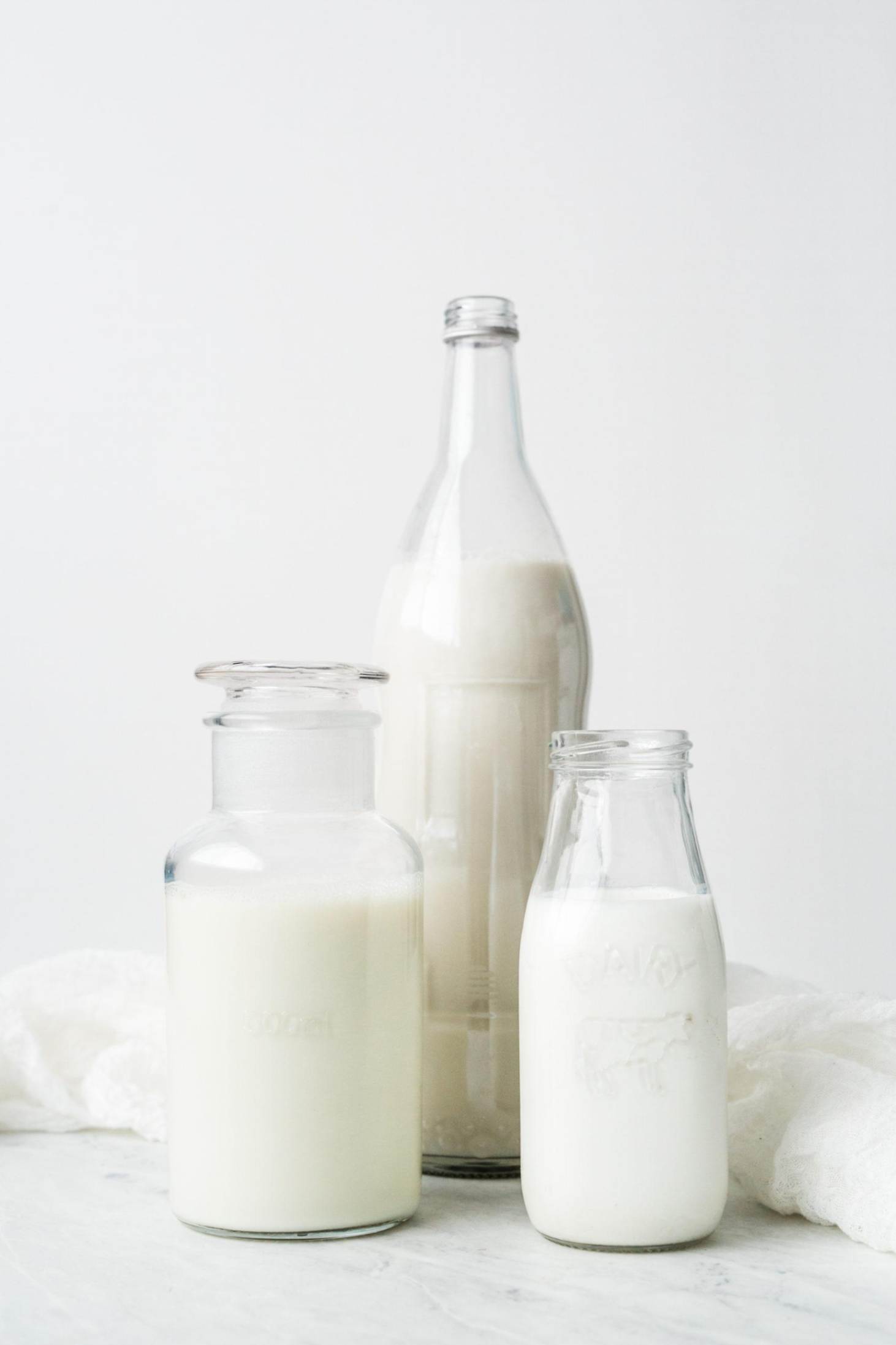When it comes to milk and the ever-growing milk alternative category, the options seem endless. With so many varieties to choose from — oat, almond, cashew, coconut, rice, soy, hemp — how do you know which healthy milk alternative to add to your cart? The answer depends on your personal nutrition needs, habits, and preferences.
- Consider ingredient lists; choose products with fewer additives to avoid gastrointestinal discomfort.
- Check sugar content; opt for unsweetened versions to prevent a sugar high.
- Evaluate nutrient levels; fortified options can provide essential vitamins and proteins.
Why Choose A Milk Alternative?
To start, it’s important to clarify that real dairy milk — I’m talking about traditional cow’s milk — is not an unhealthy choice. In fact, most of the time it offers far more protein, calcium, vitamin A, and vitamin D with fewer processed ingredients than most alternative milk options. Another benefit of cow’s milk is that it has a high dairy fat content, which supports vitamin D absorption and helps you stay full.
A2 milk has also become increasingly popular because it contains a protein that’s easier to digest than the protein in traditional milk. However, for people with food allergies or intolerances, dietary restrictions, certain medical conditions, or other personal beliefs, non-dairy milk alternatives are a fantastic option.
How To Choose Healthy Milk Alternatives
While finding the right healthy milk alternative to meet your needs and preferences can be challenging, it’s easier when you know what to look for and how often you consume it. If it’s just a splash in your morning coffee, what you choose won’t necessarily make a huge difference in your health. On the other hand, if you’re having a cup or more per day in cereal, a latte, smoothie, or just by the glass, it’s worth taking a closer look at what’s in there. Consider the following essential tips when picking a dairy alternative.
Be mindful of food additives
Generally speaking, opting for a simple ingredient list is always best. That being said, many popular milk alternatives contain a fair amount of additives that assist with consistency, texture, and shelf life. Some of these ingredients, like gums and carrageenan, have been shown to contribute to symptoms like bloating, gas, and gastrointestinal inflammation (though the research is still limited on humans). If you’re sensitive, it may be best to opt for a product without these additives.
Check out the sugar content
Next, you’ll want to examine the sugar content. Because traditional cow’s milk has naturally occurring sugars, it tastes much better than most nut, seed, or grain versions. This is why most milk alternatives contain a good amount of added sugar. If possible, opt for an unsweetened non-dairy healthy milk alternative to avoid that morning sugar high.
It’s also worth noting that oat milk is a higher-carb non-dairy product, meaning your body will convert the carbs into sugar. So if you’re trying to manage or lower your blood sugar, a low-carb nut milk like almond or cashew milk may be a better choice. However, if you’re allergic to nuts or soy, oat milk is a good option.
Pay attention to nutrient content
When choosing a plant-based milk, it’s important to consider the nutrition facts for each option. For example, If you’re looking to increase your protein intake, most oat, nut, rice, and seed milks offer very little. Some brands are now offering fortified milk alternatives with plant proteins like pea or hemp.
Alternatively, soy milk is a complete protein, which offers nearly as much protein as cow’s milk (roughly 7 grams per 8 ounce glass). In terms of micronutrients, many manufacturers fortify milk alternatives with vitamin D, calcium, and/or vitamin B-12. But again, in order to reap the benefits of these vitamins and nutrients, you’d need to consume approximately 8 ounces each day.
Consider your dietary needs and preferences
It’s so important to consider your dietary needs when choosing a milk alternative. For example, if you’re gluten-sensitive, most plant-based milks are safe, but be cautious with oat milk. If you have a tree nut allergy, look for options without nuts like soy, rice, or hemp milk. For vegans or those avoiding lactose, plant-based choices like almond, soy, or coconut milk are excellent options. Always check the nutrition facts label to ensure your choice aligns with your dietary needs.

Which is the Best Healthy Milk Alternative?
Now that we’ve talked through why and how to choose a healthy milk alternative, let’s review the most popular plant-based milk options.
Almond milk
Almond milk is a dairy-free plant milk suitable for vegans and people with cow’s milk allergies or intolerances as it’s naturally free of lactose. With a relatively low calorie count, it’s a fitting choice for people who need to be mindful of their calorie intake. I typically recommend unsweetened almond milk, since it contains less sugar than the sweetened version.
Fortified almond milk can also be a valuable source of calcium, especially for those on plant-based or vegan diets. Additionally, almonds are abundant in vitamin E, a vital antioxidant for skin, eye, and immune health. Certain brands add vitamin D and B-12, which support calcium regulation and nervous system function.
Rice milk
Fortified rice milk contains essential nutrients like calcium and vitamin B12, which are vital for preventing deficiencies common in vegan diets. This lactose-free, vegan, and vegetarian-friendly option is one of the least allergenic milk alternatives as it is free from common allergens like soy, gluten, and nuts.
While it closely mimics the taste and versatility of dairy milk in recipes, it contains no saturated fat. However, it’s lower in protein compared to dairy milk. To ensure you’re getting the desired nutrients, you’ll want to select fortified products with added vitamins, as nutritional content can vary among brands. Also, a quick tip: pay attention to ingredient labels if you’re trying to avoid the extra oils and sweeteners used for texture and flavor.
Cashew milk
Cashew milk, a creamy dairy-free option made from cashews and water, is rich in vitamins, minerals, and healthy fats. It’s available in unsweetened and sweetened varieties, serving as a versatile substitute for cow’s milk.
While homemade cashew milk may have less protein and fewer minerals compared to cow’s milk, it excels in providing healthy unsaturated fats, iron, and magnesium. Additionally, compounds in cashews may assist in blood sugar control, particularly for those with diabetes according to one small study published in the International Journal of Endocrinology and Metabolism. However, more long-term studies are needed to confirm these potential benefits.
Coconut milk
For those with dairy and soy allergies or sensitivities, coconut milk can often be a suitable alternative. Its lush, creamy texture makes it an excellent choice in baking too. Although coconut milk is rich in saturated fat, it has a different effect on LDL cholesterol compared to saturated fats from animal sources, which directly influence “bad” cholesterol levels. While coconut milk is not a standalone health beverage, it can be part of a nutrient-rich, balanced vegetarian or vegan diet.
Hemp milk
Hemp milk, with its earthy taste and creamy texture, can serve as a replacement for milk in cereal, cream in coffee, or yogurt in smoothies. It’s typically made from seeds and water, but commercial products may include certain thickeners, salt, or sweeteners. Hemp milk is technically a complete protein since it contains all essential amino acids.
However, research on hemp milk remains limited. It’s not as widely accessible as other milk alternatives like soy, almond, or rice milk, but major retailers do sell it. If you opt for hemp milk, try exploring other products, like hemp seeds and hemp protein powder to boost nutrition. I personally like to sprinkle hemp seeds on oats and blend hemp protein powder into a fruit and hemp milk smoothie.
Oat milk
Oat milk is an environmentally sustainable choice compared to some non-dairy alternatives. It offers a healthier fat profile than whole milk. It is crucial to check the nutritional label when purchasing oat milk, as some brands include more added sugar. According to health organizations like the World Health Organization (WHO), people should limit their sugar intake to 6 teaspoons a day. If gluten is a concern, opt for certified gluten-free oats and ensure the other ingredients are gluten-free, with the ideal composition being just oats, water, and a touch of salt.
Soy milk
Soy milk is produced by blending soaked soybeans with water and filtering out solids. It can also be fortified with nutrients like calcium and vitamin D to match cow’s milk nutrition. People choose soy milk due to reasons like lactose intolerance, plant-based diets, and shelf stability. Notably, soy is exceptional among plant proteins, providing all nine essential amino acids. With about 8 grams of protein per cup, soy milk supports energy levels.
If your priority is to consume plant milks with a good amount of protein, soy should be your go-to choice. Fortified soy milks often include vitamin D, and calcium, which are essential for bone health along with vitamin K. The isoflavones in soy milk may also help combat bone loss, as shown in a study in the Journal of Clinical Medicine.
The Bottom Line On How To Choose Healthy Milk Alternatives
With so many options available, it’s best to choose a dairy product or milk alternative based on your personal health and dietary needs, taste preferences, environmental impact, local product availability, and budget.
If you’re feeling adventurous, try a different milk alternative next time you order a coffee or better yet, pick up a shelf-stable carton — usually found in your grocery store’s inner aisles — to have on hand at home next time you’re in need of an overnight oats booster.
Need help finding the right fit for you? A Culina Health registered dietitian can provide personalized nutrition advice based on your needs and preferences. Book a session today.





